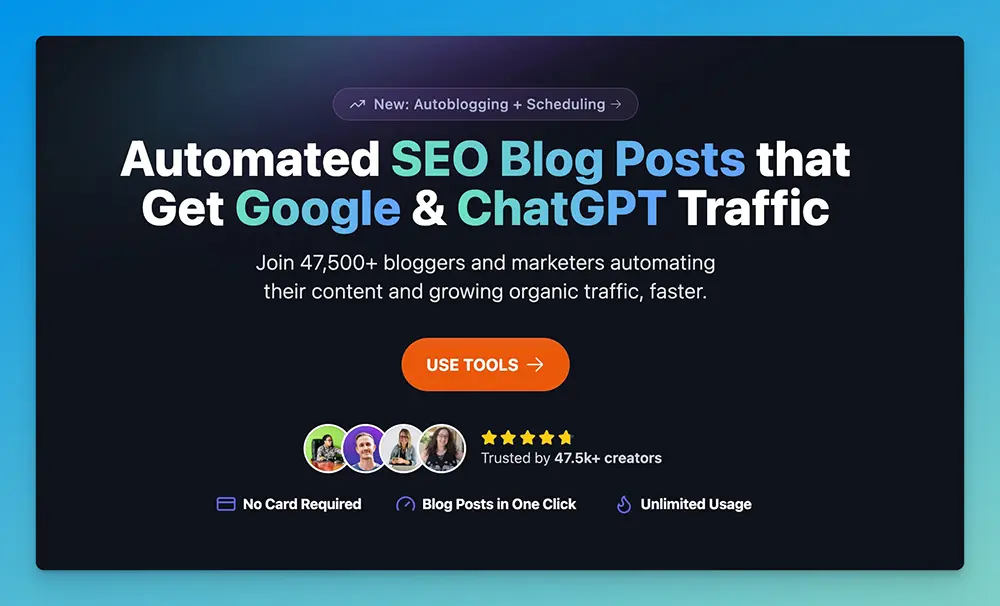5 Best Free Keyword Research Tools for Bloggers in 2026

Ah yes, looking for the best free keyword research tools? If so, you already know how important keyword research is if you want to get serious free traffic from search engines like Google. Knowing which keywords to target can make or break your content strategy.
Most bloggers worry they’ll need expensive SEO software to uncover the perfect keywords. But I’ll be the first to tell you, there are tons of great free tools you can use for doing individual keyword research and even mapping out your broader keyword clusters… and they work really well.
I’ll take you through the five best free keyword research tools out there. But if you want to get going right now, sign up for a free RightBlogger account and head straight to our Keyword Tool to dive in head first.
Create Automated SEO Blog Posts in Minutes with RightBlogger

Join 47,587+ bloggers, creators, marketers, writers, & business owners in using RightBlogger’s powerful autoblogging tools. You’ll unlock 80+ blogging, SEO, and marketing AI tools to create content faster & more effectively today. Plus, you’ll access our library of courses, a private community, Tool Studio’s AI lead magnet builder, and more.
Why Keyword Research Matters for Bloggers
You probably already know a bit about keyword research and why it’s important for getting search engine traffic .. but let’s do a quick recap.
What is Keyword Research?
🔑 Keyword research is the process of discovering and selecting keywords (search queries) that people type into Google when looking for answers, solutions, and content related to your industry or niche. By using a keyword as the basis for your blog post idea, you can craft a piece of content that’s perfectly targeted to what your audience is searching for.
Keyword research lets you:
- Discover What Your Audience Wants: Wish you knew exactly what your audience wants to read & learn? That’s what keyword research is for. By identifying popular search terms in your niche, you can tailor your content to meet your audience’s needs and interests. This means more relevant blog posts that resonate with your existing readers… as well as posts that bring in lots of new visitors to your blog. Instead of guessing what to write about, you have data-backed insights guiding your content strategy.
- Target Keywords You Can Actually Rank For: Some keywords might be pretty obvious, but many of those will be insanely hard to rank for. Perhaps you’re blogging about personal finance. It’s going to be very tough to get to the top of Google for a big, popular search term like get out of debt. The great thing about keyword research is that it isn’t just about coming up with a list of keywords. The best free keyword research tools will also give you useful information about those keywords, like their volume (how many people are searching for them) and competition (how easy/hard it’ll be to rank for them). By identifying keywords with medium volume and low competition, you can aim at an achievable target.
- Stay Ahead of Trends: Good keyword research can help you spot a rising trend before everyone else is blogging about it. By getting in early on trends, you can capture a wave of search traffic and establish yourself as a thought leader in your niche. You can also identify relevant posts you’ve already written and optimize those to better capture search traffic.
- Understand (and Beat) Your Competitors: Keyword research can also help you figure out how to beat your competitors. Perhaps Joe Blogger seems to get a ton more traffic than you… even though your posts are better-written, offering more useful insights. Keyword tools can show you what search terms are driving traffic to Joe Blogger’s site. This lets you figure out what keywords you might be missing out on (or not optimizing well enough for).
Now you know why keyword research is essential, let’s dig into the best free tools to use.
1. RightBlogger’s Keyword Research Tool

The RightBlogger Keyword Research Tool is powered by the same AI technology behind the RyRob tool … but with some extra features.
It does require you to sign up for a free RightBlogger account (but you don’t need to enter any credit card details). This account gives you access to all our samples of our tools.
Features of the RightBlogger Keyword Research Tool
What makes the RightBlogger Keyword Research Tool stand out? Let’s dive into its features:
- Keyword Volume Data: This tool provides search volume data for each keyword, helping you understand how popular a keyword is.
- Cost-Per-Click (CPC): Get insights into what different keywords cost per click for advertisers (this can help give you a sense of how monetizable those keywords are).
- Competition Analysis: Understand the competition level for each keyword so you can choose those with the best chances of ranking.
- Select Different Countries/Languages: If you’re trying to rank in a specific country, you can select this from a dropdown list. And if your keyword is in a language other than English, you can select a different language, too.
- CSV Export: Download your results as a .csv (spreadsheet) file so you can easily access them offline.
- User-Friendly Interface: Simple and intuitive design makes it easy for even newbie bloggers to use effectively.
The premium version of the tool includes extra features, like a “similar keywords” feature, plus keyword suggestions based on your use of RightBlogger. It also gives a full keyword list, whereas the free tool is limited to 25 results.
How to Use RightBlogger Keyword Tool
Here’s a step-by-step guide to making the most out of the RightBlogger Keyword Tool:
- Access the Keyword Tool: Head over to RightBlogger’s Keyword Tool. If you don’t already have an account you’ll be prompted to sign up.
- Enter Your Seed Keyword: Type in a relevant keyword that you want to explore.
- Analyze the Data:
- Search Volume: Review the monthly search volume to see how often people search for your keyword. You want keywords with a search volume of around 1,000 to 5,000. Click the “Volume” header to sort by search volume.
- CPC: Check out the CPC to estimate the ad revenue potential, if you’re thinking about running ads.
- Competition: Look at the competition level to gauge how difficult it may be to rank for the keyword. I’d aim for “low” or maybe “medium” level difficulty keywords, if you’re a relatively new blogger.
- Export Your Results: You can use the CSV download to export your keyword list to easily reference it in the future.
Pros and Cons of the RightBlogger Keyword Tool
Pros
- Free to use (no credit card required)
- Gives accurate results with full details, including volume, competition, and CPC
- Has the option to export a CSV of results
- Lets you sort results by column, e.g. volume, competition, or CPC
Cons
- Limited to 25 results on the free plan
- Requires email address for sign up
You can check out the Keyword Tool here.
2. Free Keyword Research Tool (RyRob.com)

Over on my site RyRob.com, I have a completely free Keyword Research Tool.
It’s powered by the exact same powerful AI algorithms that are behind RightBlogger and the RightBlogger keyword research tool (more on that in a moment!) but here’s the great thing … you don’t have to log in or sign up to use it.
Features of the Free Keyword Research Tool
I’ve long wanted to make one of my own free keyword research tools, because I wasn’t happy with a lot of the “free” tools out there… and I wanted to give bloggers something genuinely useful (without charging a cent for it).
My tool has:
- AI-Powered Insights: This tool uses artificial intelligence to generate keyword suggestions tailored to your niche.
- Search Volume Estimates: Know exactly how many people are searching for a given keyword each month.
- Keyword Difficulty Scores: Understand how hard it will be to rank for each keyword so you can target the low-hanging fruit. (This is CRUCIAL … don’t choose a tool without this feature!)
- Related Keyword Suggestions: Discover a treasure trove of related keywords to broaden your content’s reach.
- Competitor Analysis: Get insights into which keywords your competitors are ranking for, giving you a tactical advantage.
How to Use the Free Keyword Research Tool
Ready to give the tool a spin? Here’s a step-by-step guide to get you started:
- Visit the Tool: Go to ryrob.com/keyword-tool.
- Enter Your Seed Keyword: Type in a general keyword relevant to your blog post topic (this can be pretty broad, e.g. “personal finance” or “healthy eating”).
- Verify You’re Human: The tool may prompt you to click a box to verify that you’re a real human.
- Analyze the Results:
- Search Volume: Look at the estimated monthly searches to figure out how popular that keyword is and how much traffic it could provide. I’d recommend looking for keywords with medium search volume: 1,000 to 5,000 monthly searches.
- Difficulty Score: Check how competitive the keyword is. Ideally, you want keywords with a difficulty of “low” though more established blogs may be able to rank for “medium” difficulty ones.
- See Ideas for Keywords: Use the lightbulb icon next to any keyword to see a range of ideas on what to write about that keyword.
- Copy Your Keywords and Ideas: Create a spreadsheet or document and copy your best keywords and ideas into it. (Remember, look for low difficulty and around 1,000 to 5,000 monthly search volume.)
Pros and Cons of the RyRob Free Keyword Research Tool
Pros
- Completely free and doesn’t require any kind of sign-up (no need to provide your email address)
- Gives clear keyword volumes and difficulty ratings
- Automatically orders keywords by relevance to your seed keyword
- Offers ideas relating to your keywords to help you figure out how to build a blog post around them
Cons
- Doesn’t offer a .csv download of results (you’ll need to copy & paste)
- Can’t save your keyword research results
Give my free keyword research tool a try today … and start improving your blog’s search engine rankings.
3. Google Keyword Planner

If you’ve done any keyword research before, you’ll probably have come across the Google Keyword Planner from Google Ads.
It’s a go-to option amongst free keyword research tools for many bloggers, because it provides pretty reliable data straight from Google itself. It’s designed for advertisers … but it’s a great tool for bloggers, too, and you don’t need to pay to run any ads in order to use it.
Features of Google Keyword Planner
Google Keyword Planner is packed with features that make it an effective tool for keyword research:
- Search Volume Insights: It provides monthly search volume data for keywords, so you know how many people are looking for specific terms.
- Keyword Suggestions: Whether you need new ideas or want to expand on a topic, the tool offers a wealth of related keyword suggestions.
- Competitive Analysis: Understand how tough it is to rank for a keyword by analyzing the competitiveness.
- Ad Performance Data: If you’re running ads, you can see how certain keywords perform in terms of cost-per-click (CPC) and competition.
- Filter Options: Refine your keyword lists by setting criteria like location, language, and search networks, making the tool highly customizable.
How to Use Google Keyword Planner
Ready to get started? Here’s a step-by-step guide on how to use Google Keyword Planner:
- Sign Up for a Google Ads Account: First, you need a Google Ads account. Sign up if you don’t have one.
- Access Keyword Planner: Once logged in, head to the “Tools” menu and select “Keyword Planner.”
- Choose Your Option: You’ll have two main options. These are “Discover new keywords” or “Get search volume and forecasts.”
- Discover New Keywords: Type in a seed keyword or a URL related to your topic to generate new keyword ideas. These will then be listed along with their average monthly searches, three month changes, year on year change, and competition.
- Search Volume & Forecasts: Enter your list of keywords to see search volume data and future projections. You can type them in or upload a file. You’ll see similar data to “Discover New Keywords” along with the low and high range of bids for running ads.
- Analyze the Data:
- Keyword Ideas: Review the list of suggested keywords, search volumes, and competition levels.
- Competitiveness: Check the competition column to gauge how challenging it will be to rank for each keyword. Look for “low” competition keywords.
- Trends: Look at historical data (the three month or year on year change) to understand how keyword popularity changes over time. This can help you spot keywords that are trending.
- Refine Your Search: If you like, use filters to narrow down results by location, language, and more.
- Save Your Keywords: Save your chosen keywords or download them into a spreadsheet for easy reference.
For detailed instructions, you can refer to Google’s help page.
Pros and Cons of Google Keyword Planner
Pros
- Accurate keyword data, straight from Google
- Also incorporates paid ad planning
- Free for unlimited use
- Lets you save keywords and download keyword ideas as a .csv or Google Sheet
Cons
- Need to sign up for a Google Ads account to use Google Keyword Planner, which can be a bit fiddly
Using Google Keyword Planner can make your keyword research less of a guessing game and more of a strategic move. So why not give it a try and see how it can elevate your blogging game? For more on how to harness its power, check out this detailed guide.
4. Ubersuggest

Ubersuggest is packed with useful features and it’s been a popular SEO tool from blogger Neil Patel, for years now. You can create a free account (no credit card required) to give it a try, but be ready for a whole lot of upsells and limitations with this free keyword research tool, along the way.
Features of Ubersuggest
Ubersuggest is loaded with a variety of features that make keyword research a breeze.
- Keyword Suggestions: Get an extensive list of related keywords to broaden your content scope. Ubersuggest can also find keywords that you’re already ranking for.
- Competitive Analysis: Ubersuggest can identify your competitors (based on keywords you and they rank for) and help you see how you measure up.
- Detailed SEO Dashboard: Ubersuggest doesn’t just offer keywords. It’s also a tool to track your rankings and audit your site’s SEO.
- Search Data: The Keyword Discovery Tool shows you traffic volume, trends over time, and difficulty.
- Backlink Discovery: Analyze the backlinks of competitors so you can see exactly where their links are coming from (and attempt to replicate their success).
- Site Audit: Perform an audit of your site to find and fix common SEO issues, like pages lacking a meta description and pages with an over-long title tag.
How to Use Ubersuggest
Getting started with Ubersuggest is straightforward. Here’s a step-by-step guide to make the most of this powerful tool:
- Login to Ubersuggest and go to Keyword Research: Click Keyword Ideas to discover new keywords, based on a seed keyword.
- Run a Search: You’ll see keywords sorted by volume, with CPC data, a paid difficulty and SEO difficulty rating, and a note about when the keyword metrics were last updated.
- Save or Export Your Keywords: You can copy your keyword data to the clipboard or export it as a CSV.
- Try the Other Tools: Ubersuggest has lots of other tools, such as Keyword Visualization and Content Ideas.
Pros and Cons of Ubersuggest
Pros
- Detailed keyword data, including volume, difficulty, and CPC
- Includes competitor analysis features
- Can spot SEO opportunities and terms you’re already ranking well for
- No credit card required and no time limit for free account
Cons
- Free trial has lots of limitations: you can only run 3 “Keyword Ideas” searches per day, for instance
- The dashboard may be overwhelming if you’re just getting started with keyword research
5. AnswerThePublic

Want to know what sorts of questions your audience is asking?
AnswerThePublic is a search listening tool that uses autocomplete data to create clever visual maps of the questions people are asking.
Features of AnswerThePublic
AnswerThePublic is a bit different from other keyword research tools. It has:
- Question-Based Keywords: It pulls in real-life questions that people are typing into search engines, so you know exactly what your audience wants to know.
- Visual Mapping: Presents data in easy-to-read visual maps and charts, making it super simple to spot trends and opportunities.
- Data Grouping: Organizes keywords into categories like questions, prepositions, and comparisons, giving you a broad set of ideas for content.
- CSV Export: Easily download data as a CSV file for further analysis or to have handy while writing.
- Additional Search Engines: AnswerThePublic is great for finding out about what people are searching for on Google … but it’s also got options for Bing, YouTube, TikTok, and Amazon.
How to Use AnswerThePublic
Here’s a step-by-step guide to make the most out of AnswerThePublic’s free keyword research tool for your needs:
- Visit AnswerThePublic: Head over to AnswerThePublic and enter a short seed keyword.
- Review the Results:
- Questions: Look through the questions people are asking about your keyword.
- Prepositions: See how your keyword is being used in combination with other terms (like “… for beginners”).
- Comparisons: Discover comparison-based searches (like “X vs. Y tool”).
- Visualize and Explore: Use the visual maps to identify patterns and gaps in content that you can fill.
- Export Data: Click on the “Download CSV” button to save all the keyword ideas to your computer for easy access while writing.
Pros and Cons of AnswerThePublic
Pros
- Engaging visual interface; less “clinical” than other keyword research tools
- Gives you loads of ideas from a single seed keyword
- Great for finding long-tail keywords
- Can try it out for free, without signing up
Cons
- You’ll need to sign up if you want to run more than one search … and even then you only get 3 free searches per day.
- Can be tricky to see the keyword volumes
- No ratings of competitiveness (how hard a keyword will be to rank for)
Frequently Asked Questions about Keyword Research
What is the best free keyword research tool for beginners?
Ryan Robinson’s free keyword research tool and RightBlogger both offer a simple interface with clear keyword data. RyRob’s does not require signup and is easy to use.
Can I get accurate keyword volume and competition data for free?
Yes, most free tools show monthly search volume and a difficulty score. Google Keyword Planner and RightBlogger provide reliable data, but some tools place limits on free use.
Do I need to pay to export keyword lists?
RightBlogger, Ubersuggest, Google Keyword Planner, and AnswerThePublic all allow free CSV exports. Ryan Robinson’s keyword research tool does not offer export but you can manually copy results.
Why use more than one keyword research tool?
Using different tools can reveal new keyword ideas, different volume numbers, and varying difficulty ratings. This gives a full picture to guide your content planning.
How do I pick keywords I can rank for?
Focus on keywords with medium search volume (1,000 to 5,000 searches per month) and low to medium difficulty scores. Avoid high-competition keywords, especially if your site is new. Additionally, keyword volume, etc., can also help you figure out what to aim for when creating content to rank in LLM SEO.
Use Free Keyword Research Tools to Get More Traffic Today
Keyword research isn’t a “nice to have” … it’s an essential for any blog that wants to get new readers from search engines like Google. Hence the need for free keyword research tools, right?

I know I’m a little biased, but I strongly recommend using either my free keyword research tool on RyRob.com (which is my gift to the blogging community) or the Keyword Research Tool within RightBlogger.
Both of these free keyword tools will give you clear, actionable, easy-to-understand keyword data that you can make decisions on.
The RyRob.com tool is totally free for unlimited use, and doesn’t require any signup, but you can’t download your results and it’s a bit more limited in scope.
Our free Keyword Research Tool is part of 80+ powerful RightBlogger tools, including the Keyword Cluster tool and other SEO tools… and it’s well worth a try with a free account. You can easily upgrade to RightBlogger Pro for unlimited usage (just $29.99/month) if you want to get all its advanced features too.
If you are a subscriber to RightBlogger, you can also do a SERP analysis with an SEO report (along with one click auto optimize) when creating content to know exactly what keywords and topics your article should mention.
Create Automated SEO Blog Posts in Minutes with RightBlogger

Join 47,587+ bloggers, creators, marketers, writers, & business owners in using RightBlogger’s powerful autoblogging tools. You’ll unlock 80+ blogging, SEO, and marketing AI tools to create content faster & more effectively today. Plus, you’ll access our library of courses, a private community, Tool Studio’s AI lead magnet builder, and more.
What data should a free keyword research tool show me?
A good free keyword tool should show search volume, keyword difficulty or competition, and ideally CPC (cost per click).
Search volume tells you how many people search that phrase each month. If you are unsure what volume really means, this quick definition of search volume can help.
Difficulty or competition matters just as much as volume. A keyword with high volume can still be a bad choice if the competition is too hard for your site to beat.
CPC is a bonus metric. It can help you spot keywords that are more likely to make money with ads, affiliates, or products.
What keywords should I target if my blog is new?
If your blog is new, target keywords with low competition and medium search volume first. A common sweet spot is around 1,000 to 5,000 searches per month, as long as the keyword is not too hard.
Also choose keywords that match the reader’s goal. For example, “best budget planners for college students” is clearer and easier to write than a broad topic like “budgeting.”
Start with long, specific phrases and build from there. These “long tail” topics often rank faster and bring visitors who are ready to take action.
As you publish and earn links over time, you can slowly go after harder keywords. Think of it like leveling up your blog’s SEO strength.
Why do different keyword tools show different search volume numbers?
Different tools can show different numbers because they use different data sources and different ways to estimate traffic. Some tools pull directly from ad platforms, while others use models and clickstream data.
Even Google based tools can show ranges or averages instead of exact counts. That is normal, especially for lower volume keywords.
Use the numbers as a guide, not a promise. The goal is to compare keywords and pick the best opportunities, not to predict exact traffic.
A simple workflow is to check volume and difficulty in one tool, then cross check a few top keywords in another tool before you commit to writing.
How do I turn keyword ideas into a content plan or keyword clusters?
To build a content plan, group related keywords into one main topic and several supporting posts. This helps you cover a subject fully and makes internal linking easier.
Start by picking one “main” keyword for a strong pillar post. Then choose 5 to 10 close variations and question keywords for supporting articles.
This approach is often called keyword clustering. If you want a simple step by step process, this guide to keyword clustering explains how to do it.
Once you have clusters, plan your publishing order. Write the pillar post first, then publish the supporting posts and link them back to the pillar.
How can RightBlogger help me go from keyword research to an optimized post faster?
RightBlogger helps by connecting keyword research, writing, and SEO optimization in one workflow. You can find keywords, plan content, and improve on page SEO without juggling a bunch of tools.
Start with the keywords tool to check volume, competition, and CPC, then pick a keyword you can realistically rank for. Export your results if you want to track your picks in a spreadsheet.
Next, build clusters and supporting topics with the keyword clustering tool. This makes it easier to create a clear content map and avoid writing random posts that do not connect.
Finally, use SEO Reports to see what to improve before you publish, like missing topics, weak headings, or keyword gaps. That step can save time and help your post compete better in Google and AI search results.
Article by Ryan Robinson
RightBlogger Co-Founder, Ryan Robinson builds SEO tools and teaches 500,000 monthly readers how to grow online. He is a recovering project addict.
New:Autoblogging + Scheduling
Automated SEO Blog Posts That Work
Try RightBlogger for free, we know you'll love it.
- Automated Content
- Blog Posts in One Click
- Unlimited Usage





Leave a comment
You must be logged in to comment.
Loading comments...